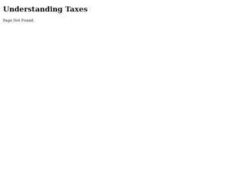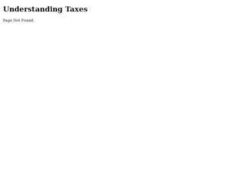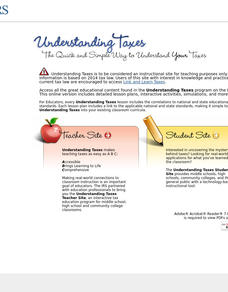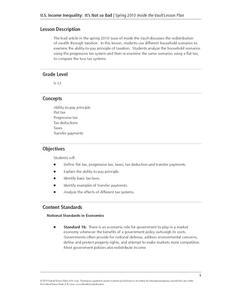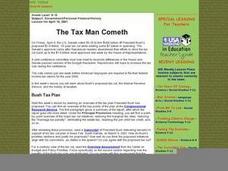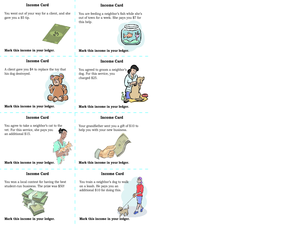Federal Reserve Bank
Income Taxes
Most adults dread April 15 — tax day! Tax preparation can be intimidating even for adults. Build confidence by leading individuals through the process and then give them a scenario to practice. The exercise uses tax vocabulary to give...
Federal Reserve Bank
Government Spending and Taxes
What types of government programs are designed to improve economic inequity in the United States? Introduce your learners to government programs, such as low-income housing, Social Security, and Medicaid, how they work to improve...
Council for Economic Education
Banks and Credit Unions (Part 1)
Imagine you have money you want to save ... where do you put it? Pupils investigate the similarities and differences of banks and credit unions as they determine where exactly to place their hard-earned money. Through a WebQuest, they...
Curated OER
Module 8-Tax Credit for Child and Dependent Care Expenses
Pupils explain the tax credit for child and dependent care expenses. They distinguish between a tax deduction and a tax credit. They see how the tax credit for child and dependent care expenses affects the tax liability.
Curated OER
Taxes in U.S. History: Tax Reform in the 1960s and 1980s
Students explain the content, purpose, and impact of the Tax Reform Acts of 1969 and 1986.
Curated OER
Taxes
Fourth graders read Stone Fax and explore earning money, saving, credit and taxes. In this taxes lesson, 4th graders complete a worksheet to develop understanding of paying off debts, keeping a checkbook, calculating sales tax and...
Curated OER
Earned Income Credit
Students distinguish between tax deduction and tax credit, explain how the earned income credit affects the tax liability, apply requirements to claim the earned income credit, and describe factors that determine the amount of the earned...
Curated OER
Module 13-Claiming Child Tax Credit
Young scholars examine the difference between a refundable tax credit and a nonrefundable tax credit. They explain how the nonrefundable child tax credit affects the tax liability. They apply the requirements to claim the child tax...
Curated OER
Dependents and Tax Credits
Students identify "count" and "non-count" nouns, and examine and discuss the Earned Income Tax Credit. They define key vocabulary words, complete various worksheets, read a newspaper article, and answer discussion questions.
Curated OER
Taxes in U.S. History: The Social Security Act of 1935
High schoolers explain the history of the Social Security Act and the FICA tax. They describe what Social Security is and whom it is intended to help. They explain the purpose of the FICA tax.
Curated OER
The Wealth Tax of 1935 and the Victory Tax of 1942
Students explain that during the Great Depression and World War II, the Roosevelt administration implemented new, broader, and more progressive taxes in order to cover the costs of the New Deal programs and the war.
iCivics
Taxation
A paycheck stub can offer loads of information on the taxes American citizens pay. This resource not only includes analysis of a stub as an activity, but also provides a wealth of informative reading material on such topics as the...
Curated OER
Stone Fox
Students use the book, Stone Fox, to explore income, capital, saving, taxes, and credit. Stone Fox tells the story of Little Willy, a ten year old who enters a challenging dog-sled race in hopes of winning money to pay the back taxes on...
Federal Reserve Bank
“W” Is for Wages, W-4 and W-2
Don't let your young adults get lost in the alphabet soup of their paychecks and federal income taxes. Using sample pay stubs and reproductions of government forms, your class members will identify the purpose of such forms as a W-4 and...
Curated OER
The Politics Of Taxation
Students explain that taxation involves a compromise of conflicting goals and that lobbyists can influence lawmakers' decisions about taxes. They can explain why people of similar incomes often pay different tax rates and work in teams...
The New York Times
Understanding the Mathematics of the Fiscal Cliff
What exactly is the fiscal cliff? What are the effects of changing income tax rates and payroll tax rates? Your learners will begin by reading news articles and examining graphs illustrating the "Bush tax cuts" of 2001 and 2003. They...
Federal Reserve Bank
U.S. Income Inequality: It's Not So Bad
What is the difference between a flat tax, progressive tax, tax deduction and transfer payments? Pupils examine the ability-to-pay principle of taxation through discussion, problem solving, and a variety of worksheets on topics from US...
Council for Economic Education
New Sense, Inc. vs. Fish 'Till U Drop or Coase Vs. Pigou
Who is responsible for protecting the environment, and who should pay when it is damaged? The role of government and private industry is complicated. A role-play simulation prompts individuals to decide how to protect a fictitious town...
Curated OER
The Tax Man Cometh
Learners examine websites and resources related to Bush's 2001 tax plan. They discuss the history of taxes and other tax topics. They look for evidence in the local newspaper of government spending at work.
Curated OER
Stone Fox and Economics
Students read the novel Stone Fox and review economic concepts including income, goods, and services. They define the following terms: capital, credit, credit risk and summarize their reading by reading several chapters at a time. They...
Curated OER
Your First Job
High schoolers determine that they are responsible for paying income taxes through withholdings on earned income. They examine the Form W-4.
Curated OER
What Does Percent Have to Do With It?
Fourth graders go shopping for a real life experience involving percent. They explore the concepts of sales tax and discount prices.
Curated OER
Income and Expenses
Students discuss income and expenses. In this instructional activity on money, students define income and expenses, after whith they keep track of their income and expense transactions on a basic ledger.
PBS
Financial Crisis Glossary
Secondary learners explore the background and vocabulary surrounding US and global economic crises. Originally, the instructional activity was written to address the 2008 economy, but the material and information is easily adaptable to...





